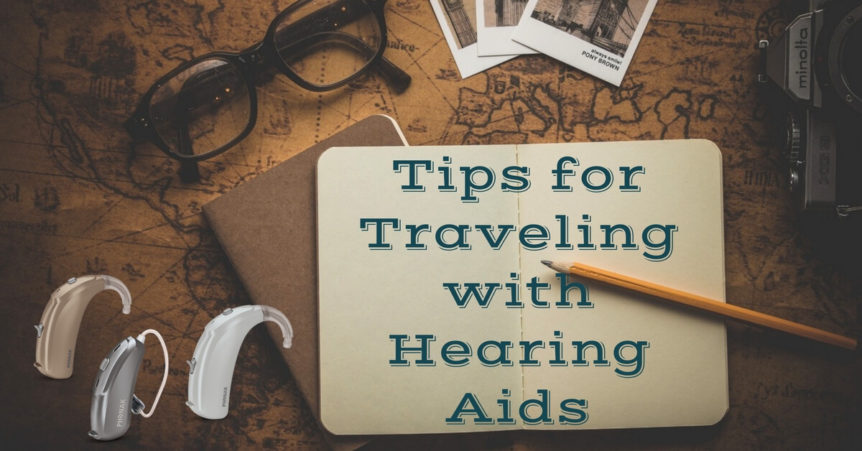For work or for pleasure, there’s always a good excuse to fit some travel into your life! Visiting places is fun and exciting and you’ll always return with new stories, new memories and -if you’re lucky- new friends. Traveling with a hearing aid isn’t difficult, but there are a few things to keep in mind that help make the journey easier.
Before You Go
Make a List and Check It A Lot
Being prepared is the best defense to the curveballs travel may throw at you. Make a list of everything you need to power and maintain your hearing aid. Important items to bring include your cleaning tools, earmold blower, extra tubing and batteries, a dehydrator, zip-lock bags, and a waterproof hat. If you’re traveling abroad, check if you’ll need an adapter plug to power a battery charger or drying kit.
It’s also important to carry a paper copy of your hearing aid settings and manufacturer’s customer service contact information in case your device needs to be reset or repaired. Bring a pencil and paper pad in case of a hearing aid malfunction and carry a paper record of your travel plans and itinerary. Make sure to prioritize these items in your carry-on luggage and double-check them whenever you set off for a new destination, disembark any vehicle or leave any hotel or lodging.
At the Airport
Baggage Check and Security
Airport security is never fun, but knowing what to do with your hearing device can help it be less of a hassle. Always pack your hearing equipment and accessories in your carry-on luggage. Though infrequent, you don’t want the risk of your checked luggage being lost to trip up your trip.
For the metal detector or body scan you’ll probably have to take your shoes off but you can leave your hearing aid in and on. TSA recommends this, although you may experience distorted sounds while walking through the scanner.
At the Gate
Airport terminals are busy, noisy places and oftentimes make it difficult to catch critical announcements such as gate changes and flight delays. When you reach your flight gate notify the attendant on duty that you have a hearing impairment and ask them to let you know about changes to your departure either personally or via text alert. You can also check with your airport ahead of your travel date to see if they offer assistive technology. Hearing loops are common in many airports which work with any hearing aid with a telecoil. Additionally, several free travel apps are also available to keep you updated via smartphone on flight updates.
During the Flight
Hearing aids can remain on during the duration of airplane flights, even during announcements to turn off all electronics. Inform your in-flight staff that you have a hearing impairment in the event of an emergency or other communication.
On the Road
Trains and Buses
If you are traveling by train or bus many of the same preparation suggestions still apply. It’s best to have your travel plans printed out and at the ready and to keep your most necessary items close to you in a carry-on bag. Review your route so you have an alternate way of figuring out when you’ve arrived at your destination. If there are no visual signs you can use your estimated arrival time or count stops.
When traveling on a train or bus be sure to communicate with your station staff, conductor and/or bus driver that you have hearing loss, especially if you need to hear a station announcement or a destination stop. Be on the lookout and check ahead for the availability of assistive technologies on board and at transit hubs and stations.
Lodging and Hotels
A little planning ahead can make sure your travel lodgings are safe and comfortable. As with your transit, it’s best to have a printed itinerary of your lodging plans and a printed map to help you navigate. It’s important to inform your accommodations that you have hearing loss. Some hotels can provide visual alerts for room service, hotel communication and emergencies as well as assistive listening devices, television remotes for closed captioning and vibrating alarm clocks.
ADA Rooms
In the United States hotels and motels are required to have a percentage of their rooms equipped for the hearing impaired. It is best to request an “Accessible Room” or an “ADA Kit” when making your reservation, and to inquire about what resources will be available to you, especially in case of fire or emergency. It may be a good idea to bring your own alarm clock especially if your lodging cannot confirm it has sonic alarms available.
Have an Amazing Time
Traveling is always an adventure, and its worth the extra effort to make sure you have a great trip. To ensure you have the best time possible, just keep in mind what you’ll need to take care of your hearing device. Contact us at Custom Hearing for any maintenance and repairs before you go. Being ready for travel and organized about your trip will help you relax, have fun and savor the experience. Bon Voyage!
Custom Hearing Solutions
Conveniently located in Omaha and Lincoln, there's a Custom Hearing Solutions clinic near you. We look forward yo hearing from you.
(402) 515-9028

